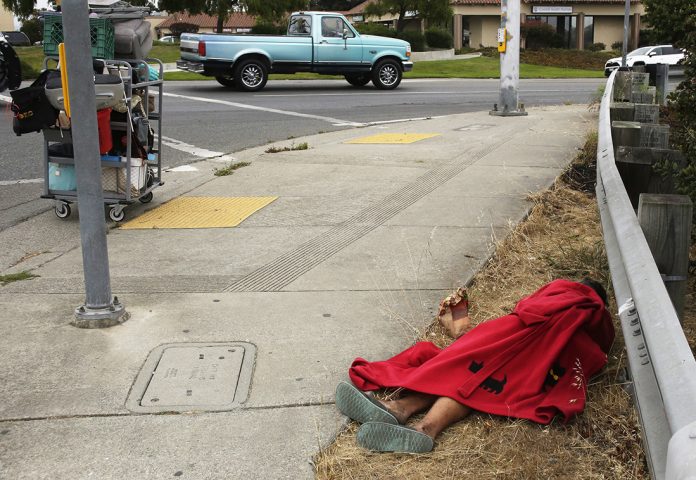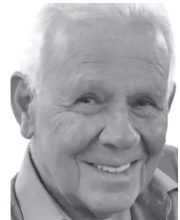By Jacob Pierce, Good Times Editor
Several hours after a new stay-at-home order took effect Friday, Housing Matters Executive Director Phil Kramer opened up a Homeless Memorial Zoom call by reflecting on a difficult year marked by the Covid-19 pandemic and devastating wildfires.
Kramer, the event’s host, said that—for all the hardship 2020 has entailed—the year also showcased many reasons for hope, optimism and inspiration. Kramer invoked the generosity that so many showed during the summer’s wildfires, and he called on Santa Cruz County community members to remember that and to channel a similar sense of compassion into other crises, including ones that have been going on much longer.
“We opened our bedrooms and our parking spaces. We treated it like the crisis it was. We have not always responded the same way to homelessness,” he said.
Although many homeless services improved during the year 2020, Kramer believes that everyone can step up to do even more.
During the 90-minute ceremony, organizers read the names of the 77 individuals who died this year, one by one, along with their ages. They also listed the names of housed community members who had previously been homeless and who died this year.
While the average lifespan for housed Americans is 72 years, the average lifespan for homeless is 52.9 years, officials said. None of those deaths listed were from coronavirus. Around 1,200 people in the county typically sleep in parks, along the levees and such nightly. The oldest name read aloud was Robert Weller, 87. More than 50 were 60 or older.
“As they died without shelter they did not die without community,” Rev. Beverly Brook said.
David Davis, a Homeless Persons’ Health Project (HPHP) administrative aide, compiles the annual report. He said Santa Cruz’s homeless residents died at a rate 5.4 times higher than housed residents. If homeless people passed away at the same rate as those who were housed, the county would have lost 15 of 2,109 local homeless residents, instead of 77, Davis explained.
The numbers may not be completely precise, as members of the homeless community can be difficult to track numerically. The official total of homeless residents is based on a Point-in-Time Homeless Census that involves volunteers driving around Santa Cruz County early one morning every other January and counting as many presumed homeless people as they can find. Due to that, the results of such efforts are widely regarded as an undercount. Davis estimated to GT earlier this year that his list of homeless deaths may also represent an undercount—by about 10%.
And so, by the only numbers available, Davis says that if housed people had passed away at the same rate as homeless people, 9,874 housed people in the county would have died this past year, instead of 1,882. And according to this year’s report, homeless residents died 23 years earlier than housed residents on average.
“These are shocking statistics,” he said.
The local Homeless Memorial is part of a larger tradition of mourning, and Monday, Dec. 21, will mark the Winter Solstice, the longest night of the year. Activists from around the United States mark it as Homeless Memorial Day.
Toward the end of Friday’s Zoom event, Kramer opened up the memorial to guests who wished to share memories and poems in honor of those who had passed, prompting many to speak up.
Sherry Brown reflected on her love for her twin brother Perry Brown, who died April 25. Sherry said she was grateful to HPHP for its work organizing the memorial and for taking good care of Perry, whom she says many remember for his excellent southern manners.
“He was always very polite to everyone he came into contact with,” she said.
Jennifer Roscher, a Santa Cruz County employee who used to work for the Downtown Streets Team, chimed in about her friend Shane Rojo. She said she’ll always remember Rojo as a joyous nature lover, a passionate foodie and a good hugger.
“He would wrap you up in his arms and squeeze you so tight, and I just wanted to leave you with that memory of Shane, because I feel confident, Shane Rojo, if you’re listening, I will see you again. And I expect one of those hugs,” Roscher said.
Kramer reminded those in attendance that Housing Matters is working on installing a new memorial at Evergreen Cemetery, and two artists have been selected for the project, which is in the fundraising stage. For more information, including how to donate, anyone interested may visit evergreenmemorialsc.org.
Stacey Pratt, grief support manager for Hospice of Santa Cruz County, told everyone that her organization offers free grief counseling. Those interested may visit hospicesantacruz.org or call 831-430-3000 and ask for grief support.
PARK CLOSURE
Meanwhile, the state of homeless services and management remain in flux—including in matters wholly unrelated to Friday’s memorial.
In an executive order, the city of Santa Cruz announced Thursday that San Lorenzo Park will be closing, due to the impacts of homelessness.
The order, signed by Santa Cruz City Manager Martín Bernal and Parks Director Tony Elliot, states that the closure will begin by Wednesday, Jan. 6 and last through the end of January, unless extended. City workers or contractors will likely erect some fencing. Among the reasons listed, the order explains that city facilities have been vandalized, the area has fire safety issues and that people have been violating social distancing guidelines for public health during the pandemic.










